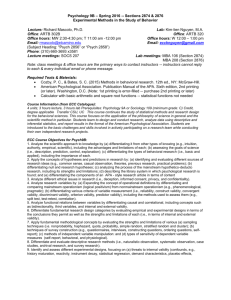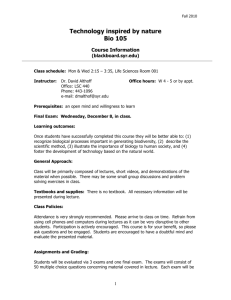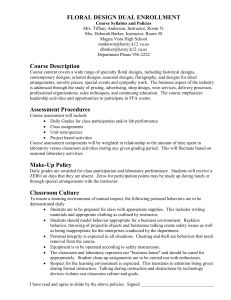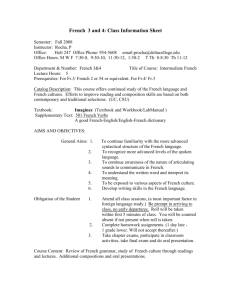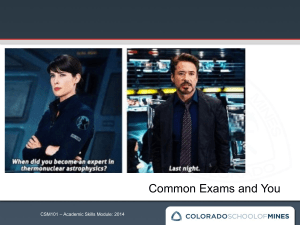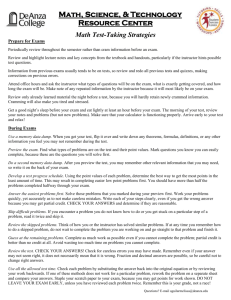Psychology 9A-Sociology 9 - Kevin Dooley's ultimate web page!
advertisement
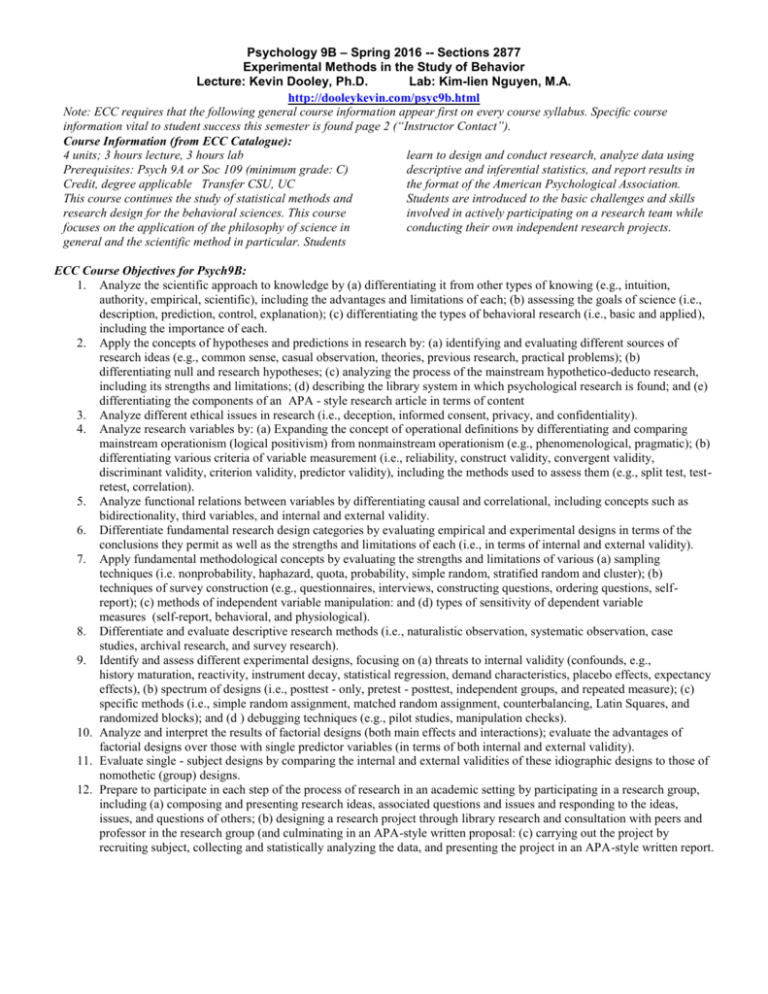
Psychology 9B – Spring 2016 -- Sections 2877 Experimental Methods in the Study of Behavior Lecture: Kevin Dooley, Ph.D. Lab: Kim-lien Nguyen, M.A. http://dooleykevin.com/psyc9b.html Note: ECC requires that the following general course information appear first on every course syllabus. Specific course information vital to student success this semester is found page 2 (“Instructor Contact”). Course Information (from ECC Catalogue): 4 units; 3 hours lecture, 3 hours lab learn to design and conduct research, analyze data using Prerequisites: Psych 9A or Soc 109 (minimum grade: C) descriptive and inferential statistics, and report results in the format of the American Psychological Association. Credit, degree applicable Transfer CSU, UC This course continues the study of statistical methods and Students are introduced to the basic challenges and skills research design for the behavioral sciences. This course involved in actively participating on a research team while conducting their own independent research projects. focuses on the application of the philosophy of science in general and the scientific method in particular. Students ECC Course Objectives for Psych9B: 1. Analyze the scientific approach to knowledge by (a) differentiating it from other types of knowing (e.g., intuition, authority, empirical, scientific), including the advantages and limitations of each; (b) assessing the goals of science (i.e., description, prediction, control, explanation); (c) differentiating the types of behavioral research (i.e., basic and applied), including the importance of each. 2. Apply the concepts of hypotheses and predictions in research by: (a) identifying and evaluating different sources of research ideas (e.g., common sense, casual observation, theories, previous research, practical problems); (b) differentiating null and research hypotheses; (c) analyzing the process of the mainstream hypothetico-deducto research, including its strengths and limitations; (d) describing the library system in which psychological research is found; and (e) differentiating the components of an APA - style research article in terms of content 3. Analyze different ethical issues in research (i.e., deception, informed consent, privacy, and confidentiality). 4. Analyze research variables by: (a) Expanding the concept of operational definitions by differentiating and comparing mainstream operationism (logical positivism) from nonmainstream operationism (e.g., phenomenological, pragmatic); (b) differentiating various criteria of variable measurement (i.e., reliability, construct validity, convergent validity, discriminant validity, criterion validity, predictor validity), including the methods used to assess them (e.g., split test, testretest, correlation). 5. Analyze functional relations between variables by differentiating causal and correlational, including concepts such as bidirectionality, third variables, and internal and external validity. 6. Differentiate fundamental research design categories by evaluating empirical and experimental designs in terms of the conclusions they permit as well as the strengths and limitations of each (i.e., in terms of internal and external validity). 7. Apply fundamental methodological concepts by evaluating the strengths and limitations of various (a) sampling techniques (i.e. nonprobability, haphazard, quota, probability, simple random, stratified random and cluster); (b) techniques of survey construction (e.g., questionnaires, interviews, constructing questions, ordering questions, selfreport); (c) methods of independent variable manipulation: and (d) types of sensitivity of dependent variable measures (self-report, behavioral, and physiological). 8. Differentiate and evaluate descriptive research methods (i.e., naturalistic observation, systematic observation, case studies, archival research, and survey research). 9. Identify and assess different experimental designs, focusing on (a) threats to internal validity (confounds, e.g., history maturation, reactivity, instrument decay, statistical regression, demand characteristics, placebo effects, expectancy effects), (b) spectrum of designs (i.e., posttest - only, pretest - posttest, independent groups, and repeated measure); (c) specific methods (i.e., simple random assignment, matched random assignment, counterbalancing, Latin Squares, and randomized blocks); and (d ) debugging techniques (e.g., pilot studies, manipulation checks). 10. Analyze and interpret the results of factorial designs (both main effects and interactions); evaluate the advantages of factorial designs over those with single predictor variables (in terms of both internal and external validity). 11. Evaluate single - subject designs by comparing the internal and external validities of these idiographic designs to those of nomothetic (group) designs. 12. Prepare to participate in each step of the process of research in an academic setting by participating in a research group, including (a) composing and presenting research ideas, associated questions and issues and responding to the ideas, issues, and questions of others; (b) designing a research project through library research and consultation with peers and professor in the research group (and culminating in an APA-style written proposal: (c) carrying out the project by recruiting subject, collecting and statistically analyzing the data, and presenting the project in an APA-style written report. Student Learning Outcomes (SLOs): SLO #1 Logic of the Scientific Method Students who finish this course with a grade of A, B, or C will be able to explain and critique essential components of the scientific method in psychological research. Students will be assessed by multiple choice exams, essay exams, or oral presentations. SLO #2 Fundamental Principles Students who finish this course with a grade of A, B, or C will be able to explain and apply essential elements of the scientific method in psychological research. Students will be assessed by: a) APA formatted paper presenting the rationale and results of an individual research project and b) multiple choice exams, essay exams, or oral presentations. SLO #3 Everyday Application Students who finish this course with a grade of A, B, or C will be able to evaluate both the adequacy and relevance of research in their efforts to understand everyday life experiences (e.g., choose a diet plan, decide if a treatment or product is safe and effective, vote for or against a proposition). Students will be assessed by multiple choice exams, essay exams, oral presentations, or research-based papers. ADA Statement: El Camino College is committed to providing educational accommodations for students with disabilities upon the timely request by the student to the instructor. A student with a disability, who would like to request an academic accommodation, is responsible for identifying herself/himself to the instructor & to the Special Resource Center. To make arrangements for academic accommodations, contact the Special Resource Center (SRC). The mission of the SRC is to facilitate academic success for verified students with disabilities by providing equal access to educational opportunities in an integrated campus setting. The SRC provides support services, adaptive equipment, computer technology, & specialized instruction designed to meet the educational needs of students with disabilities. In order to be eligible for support services or accommodations, a student must provide documentation of his/her disability or be assessed by SRC professional staff. Eligibility is determined by specially trained & highly skilled professional staff members. Specific educational needs are identified on an individual basis, & a plan is developed with each student. Examples of services or accommodations include but are not limited to: American Sign Language interpreters, testing accommodations, access technologies, or printed materials made available in alternate formats. Students with verifiable disabilities who do not wish to avail themselves of the services of the SRC may still be eligible for reasonable accommodation(s) & service(s) by contacting the Dean of Enrollment Services at 310-660-3482 located in the Student Services Center, Room 200. El Camino College recognizes its responsibility to provide an equal opportunity for education for all students. It is the policy (Board Policy 1600) of the El Camino Community College District to encourage full inclusion in all programs & services. Accommodations & alternate formats are available upon request. Please visit us in person -- east side of the Student Services Center, on the web -- www.elcamino.edu/academics/src , or on the phone -- 310-660-3295 or 424-236-6264 (VP). Instructor Contact: Lecture: Kevin Dooley, Ph.D. Email: kdooley@elcamino.edu Office hrs: Tues after class (by appointment) Class Locations: Lecture: Tuesdays 2-5:10 PM SOCS 203 Lab: Kim-lien Nguyen, M.A Email: knguyen@elcamino.edu Office hrs: TBD Lab: Thursdays 2-5:10 PM, MBA 303 Grading Basis: Lecture Grade: 3 Exams –– weighted equally – Lecture Grade is 75% of Final Grade Lab Grade: 2 APA-formatted research papers (80%); lab assignments (15%); oral presentation (5%) -- Lab grade is 25% of Final Grade Required Texts & Materials: Cozby, P. C., & Bates, S. C. (2015) Methods in behavioral research. 11th or 12th ed., NY: McGraw-Hill. American Psychological Association. Publication Manual of the APA. Sixth edition, 2nd printing (or later). Washington, D.C. (Note: Do not purchase error-filled 1st printing -- purchase 2nd printing or later) Calculator with basic arithmetic and square root functions -- statistical functions not needed Lecture Schedule: Week Starting Lecture Topic Readings 1/19 Introduction; Scientific Understanding of Behavior Ch. 1 1/26 Where to Start Ch. 2 2/2 Ethical Research Ch. 3 2/9 Fundamental Research Issues Ch. 4 2/16 Measurement Concepts Ch. 5 2/23 Midterm, Observational Methods Ch. 6 3/1 Survey Research Ch. 7 3/8 Experimental Design Ch. 8 3/15 (spring break, no class) 3/22 Conducting Experiments Ch. 9 3/29 Complex Experimental Designs Ch. 10 4/5 Midterm, Single-case, Quasi-experimental, and Developmental Research Ch. 11 4/12 Understanding Research Results: Description and Correlation Ch. 12 4/19 Understanding Research Results: Statistical Inference Ch. 13 4/26 Generalizing Results Ch. 14 5/3 Review, Misc. Topics 5/10 Final Exam Lab Due Dates (tentative): Research Proposals: Final Papers: Thursday, 3/3 Thursday, 4/28 Course Policies: Student works (e.g., homework assignments, APA papers) must be written for this current semester – works previously submitted in other courses or previous semesters of this course are considered plagiarized and will receive 0 points (see “Self Plagiarism”--Section 6.02 of the APA Publication Manual). This course will cover such topics as alcoholism, sexuality, evolution, intelligence, ethnicity, & religion. By registering for & remaining in this course, students are agreeing to treat these issues in a manner that respects viewpoints differing from their own. Exam dates are listed above--assume all announced exam dates are valid unless notified otherwise by the professor. Students are expected to demonstrate their commitment to this class & their college education by scheduling work & vacation around the times that this course meets. Students are responsible for keeping abreast of course announcements, including any changes in exam schedule or material. Study guides are not provided in this class; instead, students are expected to attend lectures in an active, purposeful way – i.e., taking extensive notes that will comprise their own study guide. Course grades are determined solely by the requirements detailed in Grading Basis above. Extra credit is offered on exams but is not invented at the end of the semester to make up for failing scores throughout the semester. Each student should have a textbook & an APA Publication manual & bring it to every class meeting: lecture & lab. ECC Policies Students who enroll in class but do not attend the first scheduled class meeting may be dropped from the roster & their places given to waiting students who were unable to enroll at the time of registration. If illness or emergency prevents a student from attending the first class session, the student must contact the instructor. A student who registers for a class & never attends is still responsible for dropping the class. Failure to properly drop a class may result in a “W” & may subject the student for any & all fees associated with the class. Students will not be permitted to attend classes in which they are not enrolled. Exceptions may be allowed by the instructor for bonafide visitors. Students who attend a class without proper enrollment (the student did not properly register or add the class) by the published deadline will not be permitted to “late add” the class except for documented extenuating & mitigating circumstances. Students are expected to attend their classes regularly. Students who miss the first class meeting or who are not in regular attendance during the add period for the class may be dropped by the instructor. Students whose absences from a class exceed 10% of the scheduled class meeting time may be dropped by the instructor. However, students are responsible for dropping a class within the deadlines published in the class schedule. Students who stop attending but do not drop may still be retained on the course roster & receive a failing grade. Students may view their registration status on MyECC. If space is available, students who have completed registration may add a class by going to the first meeting of the class & securing permission of the instructor. It is the responsibility of the student to fulfill all requirements to add a course, & to add the course by the add deadline in accordance with college procedures. Adds will not be processed beyond the add deadline. Official withdrawal from class must be processed through the online system in the Admissions Office. Failure to complete this process may result in the assignment of a letter grade of A through F. It is the responsibility of the student to officially drop a class by the deadline date. Friday, January 29 is the last day to: 1) Add classes, 2) Drop for an Enrollment Fee Refund, & 3) Drop without Notation on Permanent Record. Friday, April 15 is the last day to drop with a “W”. Students should independently confirm these important dates themselves. Student Code of Conduct http://www.elcamino.edu/administration/board/boarddocs/5500 Academic Honesty.pdf Student Rights & Grievances Procedure 5530 http://www.elcamino.edu/administration/board/policies.asp
